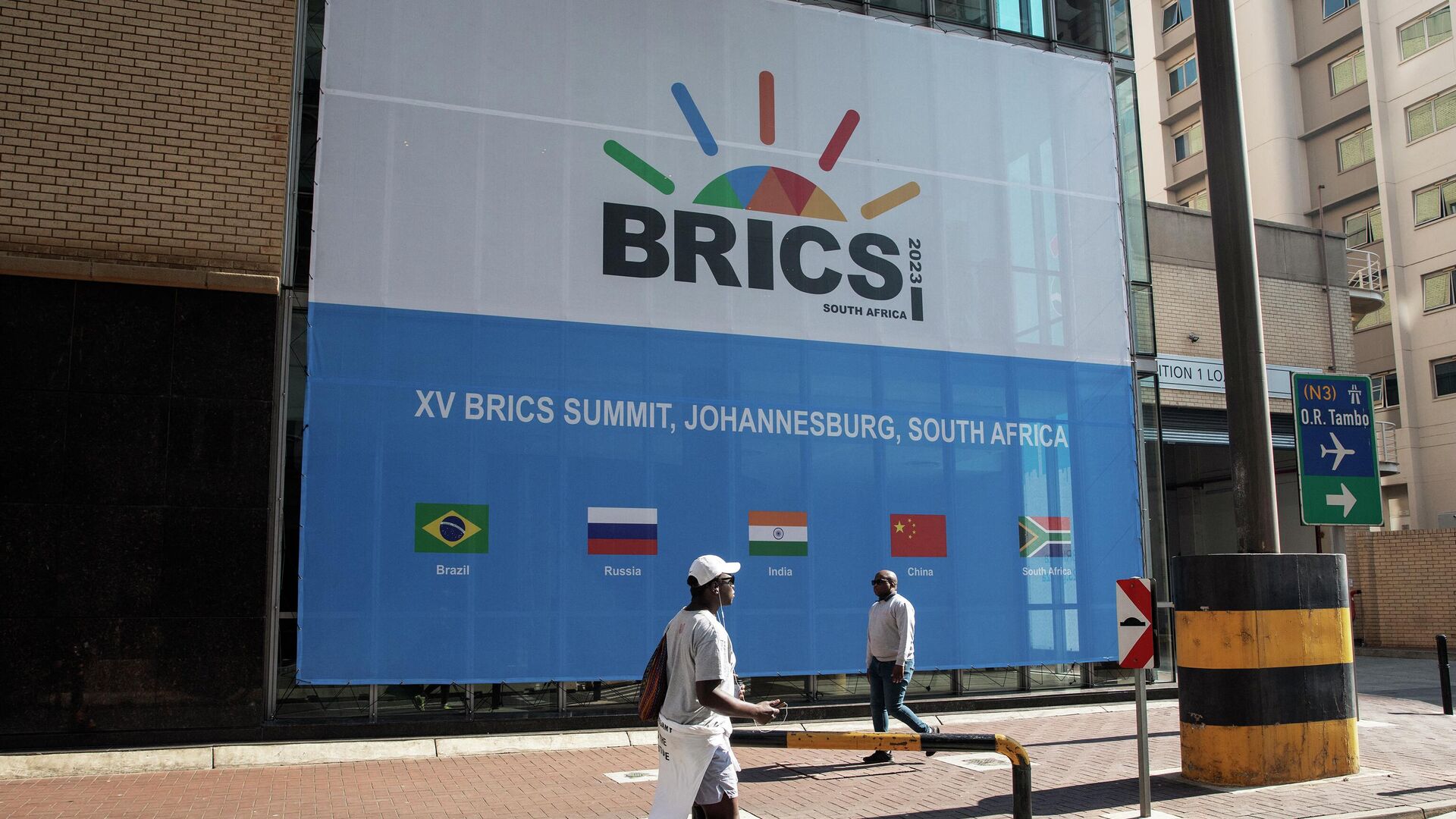Unlike West's Zero-Sum Game Approach, BRICS Believes in Multipolarity: Expert
19:02 21.08.2023 (Updated: 19:39 21.08.2023)

© AFP 2023 Gianluigi Guercia
Subscribe
Citing an unnamed Chinese official, Western media claimed that China will push the idea of BRICS becoming a “full-scale rival” to G7 at the Johannesburg Summit. But an Indian expert dismisses the report.
The agenda of BRICS states — Brazil, Russia, India, China and South Africa — is quite different from the western-led blocs such as G-7 in the sense that the five-nation grouping doesn’t view geopolitics to be a “zero-sum game”, an Indian academic has told Sputnik India.
Anuradha Chenoy, the former dean of School of International Studies (SIS) at New Delhi’s Jawaharal Nehru University (JNU), said that BRICS didn’t believe in the vision that the economic development or the security of some states could pose a threat to others.
“The BRICS do not position themselves against the West but on the contrary support a multipolar system that encourages the co-existence of different ideas, systems and institutions. It is the West that has exclusive military alliances that develop narratives against any ‘other’ that they perceive as a threat,” remarked Chenoy.
The Indian expert underlined that the core vision of the BRICS was its commitment to sovereignty, multi-polarity, non-interference, non-intervention, and opposition to coercive economic measures.
“These core principles are supported by much of the Global South. The West clearly is opposed to several of these principles. The BRICS are not a military alliance and will never be a bloc against any other,” she said.
Chenoy suggested that BRICS’ approach to geopolitics was anti-hegemony and instead advocated for inclusive security and development for all.
She also described BRICS’ approach towards other countries was a “pillar for a multipolar world".
Significantly, the BRICS countries have backed their commitment to advancing a multilateral world order in collective pronouncements as well as individual statements from time to time.
The 14th BRICS Summit Beijing Declaration last year pledged the commitment to multilateralism, backed by the central role of the United Nations (UN) in global decision-making.
In an article published in South Africa’s Ubuntu Magazine on Monday, Russian foreign minister Sergey Lavrov described BRICS as a true symbol of multipolarity.
In an address to the nation on Sunday, South African President Cyril Ramaphosa expressed concern about multilateralism being replaced by “actions of different power blocs”.
“An expanded BRICS will represent a diverse group of nations with different political systems that share a common desire to have a more balanced global order,” Ramaphosa said.
Meanwhile, the Indian foreign ministry said on Monday that BRICS was an “expression of global multipolarity”.
Global Monetary System of Multiple Currencies to Back Multilateralism: Expert
Chenoy noted that BRICS nations were increasingly invested in the idea of moving away from the US dollar in trade settlements and switch to national currencies instead.
“This trend is on the increase. But as more and more trade take place outside the dollar zone, alternate currencies will rise as the dollar can lose the kind of domination it currently has. A global monetary system of multiple currencies matches the system of multi-polarity,” she remarked.
Chenoy, however, noted with caution that BRICS nations have never collectively talked about “de-dollarization” per se, although the growing trend of the use of national currencies would serve a blow to hegemony of the US dollar.
According to the International Monetary Fund (IMF), the US dollar continues to remain the pre-eminent global currency favoured in inter-country transactions, though its use has been on the decline.
Countries like Russia, China and, to an extent, India, have been leading the global push to switch to national currencies in trade settlements, a trend which has gained further momentum in the wake of disruptions caused by western sanctions against Russia last February.
The South African presidency has said that the BRICS-backed New Development Bank (NDB) has been involved in efforts to increase lending in national currencies.
BRICS Expansion
The South African president said on Sunday that the potential expansion of BRICS membership would be on the agenda at the upcoming Summit this week.
Ramaphosa said that more than 20 countries have "formally applied" to join BRICS. "For its efforts to be more effective, BRICS needs to build partnerships with other countries that share its aspirations and perspectives," the South African president stated.
Chenoy reckoned that the idea of multipolarity has been spreading across the Global South, which was a key reason in rising interest in the BRICS grouping.
She stressed that multipolarity comprised ideas of “neutrality, strategic autonomy and resistance to western pressure” among others.
“BRICS will have to develop a mechanism of this inclusion, because it still does not have any permanent secretariat. BRICS expansion will contribute to multipolarity, but mechanisms of conversation need to be set-up,” Chenoy said.

